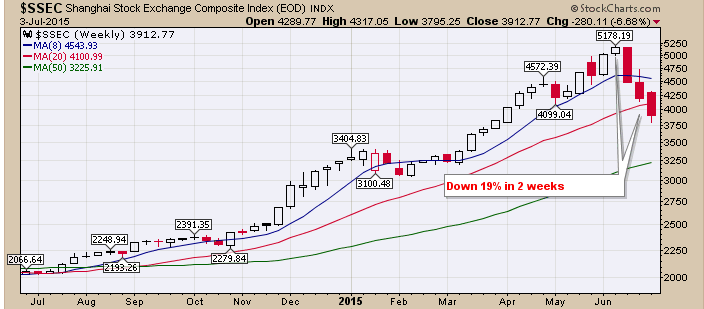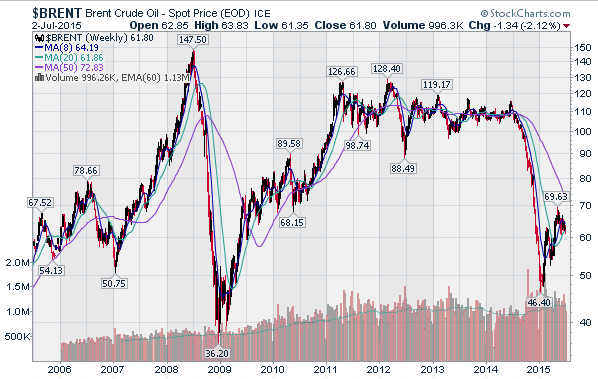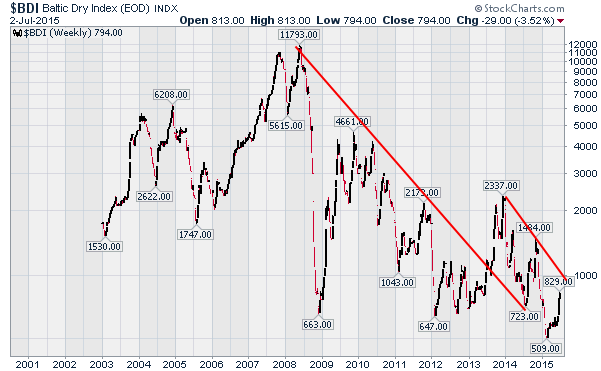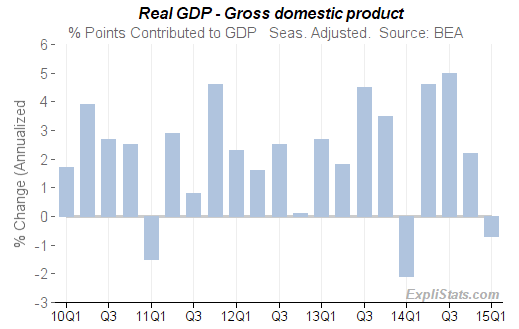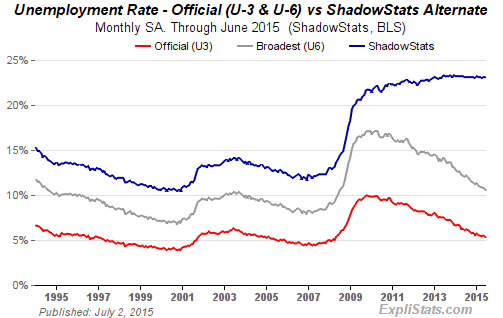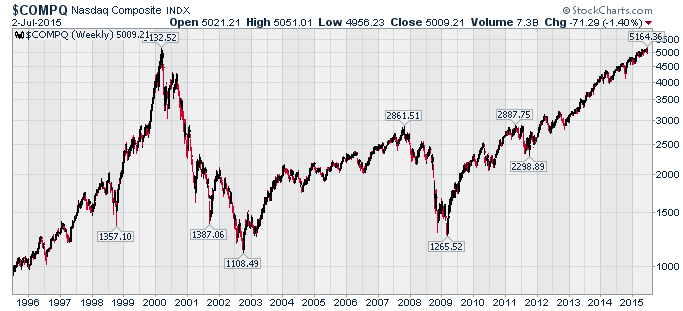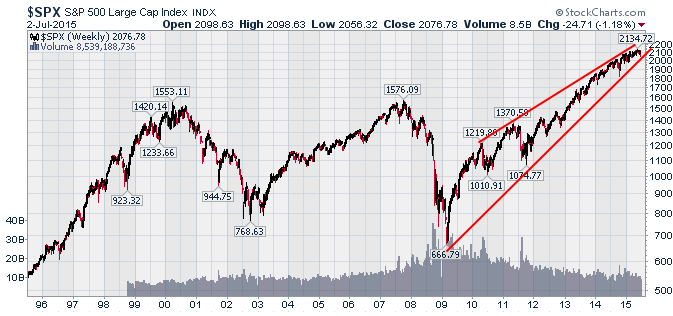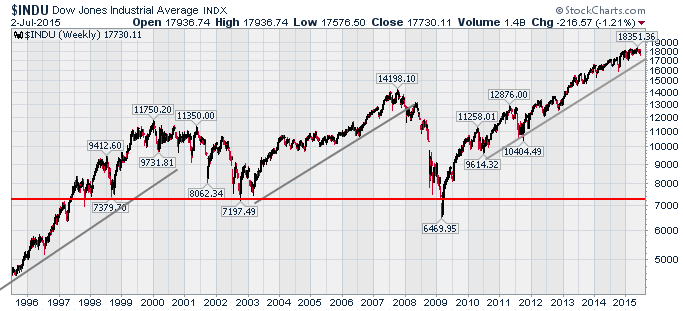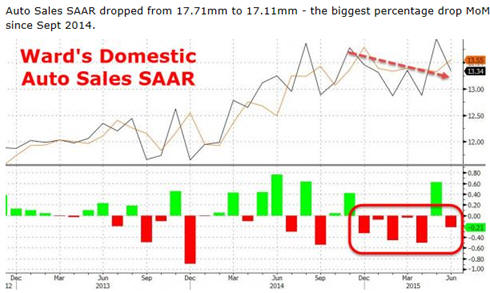'Tis Only My Opinion!™July 2015 - Volume 35, Number 7"Dominoes falling"The month of June has accelerated the rate of disturbing events which could lead to a major change in the world economic order. Of course, change has been happening for eons but some changes have more significance to societies than others. It is not just recent Supreme Court decisions and efforts to change the historical significance of the Confederate Flag or a society where personal responsibility has been discouraged by the political environment and a dependency society has evolved. Rather it is the fact that people of my generation find it difficult to relate to the values of many of the Boomer and certainly the Millennial generations. The rule of law which worked in a democratic republic is swiftly being swept aside by expediency and advocacy groups. Definitions no longer matterIn a decision that shows that words no longer matter, the U.S. Supreme Court upheld the Obamacare law. First, it was President William Clinton comments about Monicagate in a deposition about the definition of "is". Now, we have the U.S. Supreme Court saying that the wording of the Obamacare law which was crafted precisely to enable passage ... now the words can be interpreted differently. In effect, the Supreme Court has become another supreme legislative branch of government and not a judicial branch. Passing legislation without reading.Nancy Pelosi when she was Speaker of the House infamously commented that Obamacare "had to be passed so that we could find out what was in the bill." What a way to run a country that is supposedly a democratic republic! The passage of the Obamatrade bill after its initial defeat is another example of a law that was developed in utmost secrecy but had to be passed before it could be read by the members of Congress or the public. Of course, it also passed after its initial House defeat when about 70 members of Congress received substantial campaign donations to change their initial votes. Today, the U.S. Congress has become an institution where votes are bought and members do not vote based upon their conscience but rather upon the amount of money lavished upon them by various advocacy groups. Congress has become nothing but a corrupt institution significantly devoid of the founding fathers principles. Do you remember NAFTA?The North American Free Trade Agreement, or NAFTA, was passed in the belief that by reducing trade barriers and tariffs between Mexico and Canada and the United States, the US economy would benefit. NAFTA took jobs from U.S. workers and kept U.S. manufacturing wages under pressure. As a result, many American factories were shuttered and the high paying jobs were transferred to maquiladoras just across the border in Mexico. In effect, U.S. jobs where workers were receiving over $20/hour and benefits were transferred to Mexico where workers received less than $20/day. Many cities and towns throughout the U.S. have never recovered from the devastation caused by the loss of these jobs. Obamatrade will make NAFTA look like a great deal
by comparison! I find it hard to believe that U.S. politicians
from both parties cannot see what will happen going forward. Credit Derivatives contain the Key to the Meltdown coming.In 2007, the real concern following the collapse of the two Bear Stearns funds and Lehman's collapse was the impact of credit derivatives upon liquidity. To offset the potential impact, the U.S. Federal Reserve took many measures including quantitative easing and currency swaps with many nations to fight the spiraling credit derivative tornado. In 2007, the IMF estimated that the nominal amount of credit derivatives outstanding stood at about $650 trillion, an amount substantially in excess of world GDP of $57.4 trillion. In 2015, the IMF estimated that the nominal amount of credit derivatives outstanding stood about $780 trillion while world GDP had risen to about $75.1 trillion. Other sources suggest that the IMF is understating the amount of credit derivatives outstanding and that it actually exceeds $1,200 trillion. The U.S. Federal Reserve bank in June 2008 had a balance sheet of about $750 billion. Over the next two years, quantitative easing programs expanded the balance sheet to about $4.5 trillion while the total amount of off-balance-sheet credit swaps were never disclosed with other central banks. Some believe that it could have been in excess of $20 trillion. By keeping interest rates at historic low levels and paying interest on deposits at the Federal Reserve, the Fed accomplished two goals ... reliquifying the banking system and reducing the velocity of money which would increase inflationary pressures. Despite the Dodd-Frank legislation which hoped to rein in credit-default swap derivatives, the problem has not gotten smaller. Moreover, concentration of bank deposits with the five To-Big-To Fail banks has actually increased since 2007 at the expense of crippling costs and a reduction of independent and smaller banking insitutions. When defaults begin occurring, the real problem is not in the hedged amounts but in the nominal total amounts. The PIGS and Puerto RicoWhile most of the focus in the markets has been on the contagion which might occur if Greece defaults and the other PIGS might follow, the biggest problem for U.S. investors might be the $72 billion of Puerto Rico municipal bonds. The bonds are guaranteed by U.S. reinsurers who may not have the capital to make good. The lack of reinsurance could raise havoc to the municipal bond market and start to impact the sale of bonds. Greece is now asserting and probably correctly that the bailout funds from the EU and the IMF were fraudulent since both the issuer and the holder knew that they could not be repaid. By rolling over debt issued prior to 2008, the lenders were simply refusing to recognize on their own books that the debt was worthless since doing do would have placed their institutions in serious jeopardy. Some might even call it criminal and fraudulent. "Kicking the can down the road" eventually runs out of road. And Germany can not continue to simply provide capital to its Eurozone partners. Not only is the surplus in jeopardy but about 50% of German municipalities are facing debt levels that mimic Greece. German municipalities currently need more than 100 billion euros to renovated their dilapidated infrastructure. As Margaret Thatcher stated: "The problem with socialism is that you eventually run out of other people's money." The China market is correctingDuring the past two weeks, a major correction has occurred within the Chinese stock market which has benefited from loose accounting standards, high expectations and easy central banking policies. After being the world equity market leader during the past year risings from 2018.36 to 5,178.19, a gain of 3,159.83 points or 156.6%, the Chinese Shanghai Stock Exchange Index (SSEC) has fallen over 20% in the past two weeks.
The Chinese Central Bank in order to offset some of the deteriorating problems reduced its lending rate on Friday. Margin calls are beginning to mount throughout the equity and bond markets. The real risk lies in the credit derivatives which have not been reduced since the 2007-2008 financial meltdown but have actually increased. Energy Prices and World TradeAlong with historic low interest rates, energy prices have fallen significantly since 2008 as shown in the following chart of Brent oil.
However, the decline in energy costs has not helped world trade. The Baltic Dry Index is considered by many to be a proxy for world GDP and the chart shown below would suggest that we do not have a booming world economy.
The U.S. EconomyIt has been almost eight years since Bear Stearns had its problem. Despite falling energy costs, the Fed's easy money policies and the governments regulatory actions have not jump-started the U.S. economy. GDP growth in the U.S. was negative in the first quarter of 2015 even after changing the definition of the series last year. Moreover, based upon current data this quarter, it would appear that real GDP in the 2nd quarter might also be negative.
The unemployment rate as measured by the U-3 series continues to decline. Of course, the U-3 unemployment rate of 5.2% in June 2015 was lower because the labor participation rate has dropped to 38 year lows. The U-6 unemployment rate was 10.6% while Shadow Government Statistics using the methods before all the Ministry of Truth redefinitions was a whopping 23.1%.
Moreover, of the 223,000 new jobs added in June 2015 which the Ministry of Truth headlined, almost one-third of those jobs were added by the birth/death rate adjustment. Moreover, May's initially reported 280,000 new jobs was revised downward by 26,000 to 254,000, or an adjustment of almost 10%. Also, the total adjustment between April and May for jobs were reduced by 60,000. What is really disappointing is that the number of people holding full-time jobs actually fell by 349,000 during June 2015. The U.S. Market is not acknowledging the Real World!The equity indices in the U.S. have made new "nominal" highs during June 2015 as seen in the following charts.
The key word in the above sentence is nominal. Since almost 80% of the days in which the market has moved higher, market volume has been lower since January 2015. To me, this means that institutions and large investors as selling into strength realizing that the economy is not doing well both in the U.S. and overseas. The auto industry announced its June 2015 results and they were lower than expected. In fact, it was the largest month-to-month drop since September 2014 and the industry missed sales expectations six of the last seven months. Moreover, if sales to governments of trucks and pickups had not surged significantly, the June 2015 would have been seen as a disaster.
The failure of the housing industry to generate significant gains is also of concern. Recent trends in lumber prices which almost always precedes moves in the housing sector looks troubling.
Since 2007, the stock market has been moving higher. However, over 80% of corporate profits have been used to pay dividends and buy-back corporate stock .... neither of which really build corporate infrastructure or fund research and development projects. ConclusionCentral banks are unwilling to acknowledge that the Keynesian model has failed. The problem facing the financial markets is not one of liquidity but of insolvency. There is simply too much debt and it cannot just be inflated away. Those politicians who believed that they could "kick-the-can-down-the-road" and they would not be blamed for all the deficit spending and vote-buying programs that can not be financed are about to discover that the cliff is nearby. Stock prices have gotten over-done and the bull-market is getting near its end. A series of events, or dominoes, are now coming together to trigger the end of the bull. The PIGS, Puerto Rico, Eurozone, China's selloff and a faltering U.S. economy all point the end of this bull market. Conservative investors should be very wary going forward. But then - 'Tis Only My Opinion!Fred Richards www.adrich.com Corruptisima republica plurimae leges. [The more corrupt a republic, the more laws.] -- Tacitus, Annals III 27 'Tis only My Opinion! Archive Menu, click here. This
issue of 'Tis Only My Opinion was copyrighted by Strategic Investing in 2015. |
